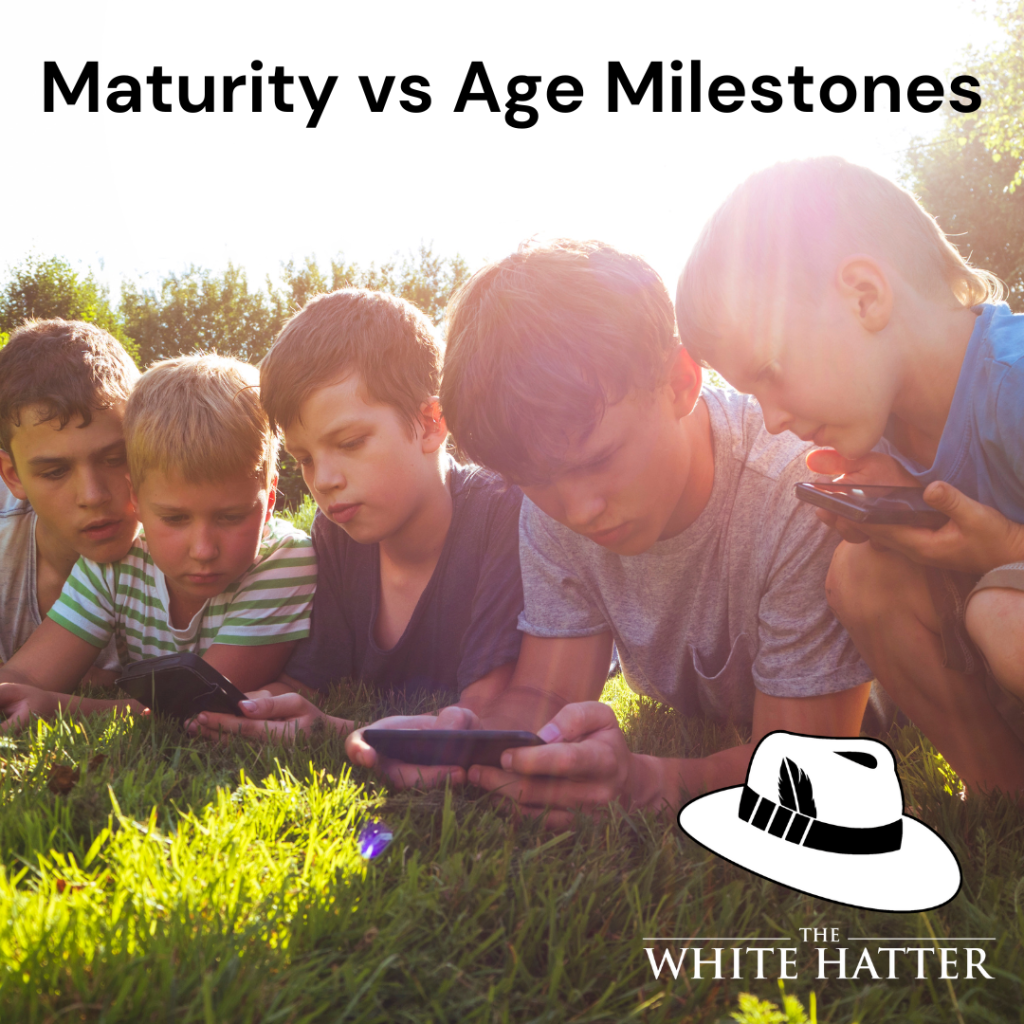Maturity Milestones vs Chronological Age Milestones - Is Your Child Ready To Go It Alone With Technology and Social Media?
- The White Hatter

- Jul 21, 2024
- 5 min read
Updated: May 7, 2025

CAVEAT – When considering the maturity milestones that we will be speaking to in this blog article, look for a cluster rather than just one or two when making your assessment as a parent or caregiver.
As parents and caregivers, we often wonder when the right time is to allow our children to dive into the world of technology and social media alone. While many social media platforms set the minimum age at 13, it's crucial to understand that chronological age alone is not a definitive measure of readiness. This is one reason why we at the White Hatter are not big supporters of age milestones – we have met 13-year-olds who have the maturity level of a 18-year-olds, and we have met 18-year-olds who have the maturity level of a 13-year-old.
Maturity milestones, encompassing a child's ability to handle responsibility, demonstrate independence, and navigate complex social interactions, provide a more accurate gauge of their preparedness, and this can differ from child to child. This blog article aims to help parents assess their child's readiness to access technology or social media alone, by focusing on developmental and behavioral milestones, rather than age milestones, ensuring that when they do venture into the onlife world alone, they do so in a safer and more responsible manner.
It is important for parents and caregivers to know that the establishment of age 13 as a minimum requirement for social media usage such as snapchat, Instagram, or TikTok, is primarily a consequence of the U.S. Children's Online Privacy Protection Act of 1998 (COPPA). This law restricts the collection and storage of personal information from children under 13 years of age. COPPA was designed to protect young children from online risks by preventing companies from gathering data without parental consent. While this legal benchmark is essential for protecting young user’s privacy, it should not be the sole factor in determining your child's readiness for social media or technology.
According to Dr. Devorah Heitner (1), a child safety advocate, readiness for the responsibility of having access to the entire world through a device is not guaranteed by simply reaching a specific age. Instead, she suggests evaluating your child's readiness through various independence milestones. Here are some milestones that she offers to parents for consideration:
#1Making Lunch Without Help:
Preparing a meal independently demonstrates your child's ability to follow steps, manage time, and take care of themselves. This responsibility shows a level of maturity and self-sufficiency.
#2 Walking Home from School Alone:
If your child can navigate their way home safely and responsibly, it indicates they understand how to stay safe in public spaces and make decisions independently.
#3Spending Brief Periods Home Alone:
Trusting your child to be home alone for short periods shows they can handle emergency situations and manage their time without direct supervision.
#4Babysitting a Younger Child for Short Windows of Time:
This responsibility highlights your child's ability to care for others, demonstrating empathy, patience, and a sense of responsibility.
#5Riding Public Transit Independently:
Navigating public transportation requires understanding schedules, routes, and safety precautions, indicating a higher level of independence and responsibility.
#6Being Organized with Homework:
Completing homework on time and managing school responsibilities demonstrate your child's ability to prioritize tasks and manage their time effectively.
If your child is demonstrating independence in several of these areas, they may be ready or nearly ready for a fully functioning smartphone. If not, consider setting progressive milestones for your child to work towards, helping them to gradually develop those necessary skills and responsibilities.
Another child safety advocate, PediatricianDr. Natasha Burgert (2) also emphasizes the importance of developmental readiness over a specific age benchmark. Before deciding to buy a smartphone for your child or allowing unsupervised access to social media, Dr. Burgert suggests considering the following attributes that are associated with successful digital use:
#1Complex Thoughts and Improved Reasoning:
Can your child understand and analyze situations, make informed decisions, and consider the consequences of their actions?
#2Understanding Tone, Idiom, and Sarcasm:
Effective communication online requires understanding nuances in language, which helps in interpreting messages accurately and avoiding misunderstandings.
#3Developing Their Own Solutions:
Problem-solving skills are crucial for navigating challenges online, such as dealing with cyberbullying or managing time spent on social media.
#4Demonstrating Early Long-Range Planning:
Can your child set goals and make plans for the future? This skill is important for managing long-term projects and commitments.
#5Showing Signs of Empathy and Thinking of Others:
Empathy is essential for positive interactions online, helping your child understand and respond appropriately to the feelings and needs of others.
#6Developing a Stronger Sense of Right and Wrong:
A clear understanding of ethical behavior will help guide your child in making responsible choices online.
#7Showing More Interest in and Being Influenced by Their Peer Group:
Social media amplifies peer influence. Ensure your child can handle peer pressure and make independent decisions.
#8Responding Appropriately to Limits and Boundaries:
Respecting rules and boundaries is crucial for safe and responsible social media use.
#9Improved Communication for Wants and Needs:
Effective communication skills help your child express themselves clearly and understand others, reducing the risk of conflicts and misunderstandings online.
The highly respected eSafety Commissioner in Australia (3) also suggests additional maturity milestones for assessing your child's readiness for technology and social media:
#1 Understanding How to Deal with Negative Online Experiences:
Does your child know how to handle cyberbullying, harassment, or inappropriate content? Can they seek help if needed?
#2Knowing the Importance of Protecting Personal Information:
Understanding the risks of sharing personal details online is crucial for safeguarding privacy and security.
#3Understanding How Privacy Settings for Social Media Work:
Does your child know how to set and adjust privacy settings to control who can see their information and posts?
#4 Knowing What Is Safe to Share Online:
Can your child differentiate between appropriate and inappropriate content to share, protecting themselves and others from potential risks?
#5 Knowing How to Report Cyberbullying and Other Kinds of Abusive Content:
Reporting mechanisms are essential for maintaining a safe online environment. Ensure your child knows how to use these tools effectively.
#6Willingness to Let You Establish Clear Rules and Supervise Their Social Media Activity:
Open communication and parental supervision are vital for guiding your child's online behavior and ensuring their safety.
While age 13 is a legal benchmark under COPPA, assessing your child's readiness for social media requires a comprehensive evaluation of their independence, developmental milestones, and online safety skills. By considering these factors, you can make a more informed decision about when your child is ready to navigate the onlife world responsibly without direct adult supervision. Establishing clear rules, maintaining open communication, and providing guidance will help your child develop healthy and safer online habits.
By Integrating both maturity milestones and digital literacy education with proactive, engaged onlife parenting (4)(5), we can better equip our kids with the skills and confidence needed to navigate technology and social media in a safer and more independent and responsible way. Balancing supervision of your child's online activity depends on your family's values, maturity milestones, and your child's needs.
Digital Food For Thought
The White Hatter
Facts Not Fear, Facts Not Feelings, Enlighten Not Frighten, Know Technology vs No Technology!
References:














